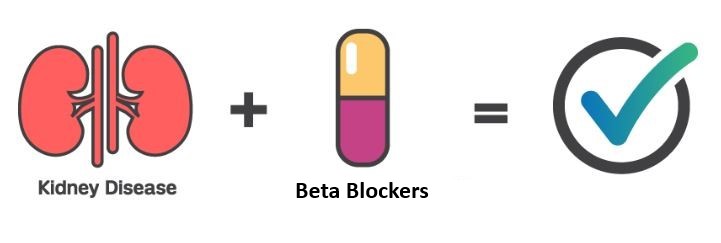Hypertension is the second leading cause of end-stage renal disease,1 and studies suggest that a direct relationship may exist between blood pressure and renal disease progression.2 It is important for patients to control blood pressure in order to lower cardiovascular risk and prevent the progression of renal disease. Patients with hypertension and chronic kidney disease (CKD) should aim for a blood pressure of less than 130/80 mm Hg.3 Treatment with an angiotensin-converting enzyme inhibitor (ACEI), or an angiotensin receptor blocker (ARB) when an ACEI is not tolerated, is recommended for adults with hypertension and CKD.3 However, CKD patients are often required to take three or more antihypertensive drugs in order to achieve blood pressure control. Beta blockers, especially vasodilating types, are as effective as other medications as second- or third line- agents to protect renal function and achieve blood pressure control in CKD patients.4
Beta blockers such as atenolol, carvedilol, labetalol, metoprolol, and propranolol are commonly used beta blockers in the management of CKD.5 Renal impairment may impact the dosing of beta blockers primarily eliminated by the kidney.6,7 Manufacturers of atenolol caution its use in patients with impaired renal function.8 As atenolol is excreted by the kidneys, dosage should be adjusted for patients with severe renal impairment, reduced by one-half to three-quarters of its normal dose.5 Manufacturers of carvedilol suggest that doctors should carefully monitor renal function in patients with underlying renal insufficiency upon initiation or during up-titration of the drug.9-12 Carvedilol is primarily metabolized by the liver, but renal impairment can increase carvedilol plasma concentrations.11 Patients with severe renal impairment should also use nebivolol with caution as renal clearance of the drug may be decreased.13 Renal impairment does not affect the metabolism of labetalol14 or metoprolol,15,16 thus no dose changes are required.
As a class, beta blockers have significantly varying properties.5 Reduction of cardiac output and impairment of renal perfusion by non-vasodilating beta blockers may be harmful for patients with CKD, whereas vasodilating beta blockers (e.g., carvedilol, nebivolol, labetalol) may have renoprotective effects.4 A systematic review and meta-analysis reviewed clinical trials of beta blockers, including acebutolol, bisoprolol, carvedilol, metoprolol, and nebivolol, in patients with CKD.17 In 5,972 patients with CKD and heart failure, beta blockers reduced the risk of all-cause mortality (risk ratio [RR] 0.72, 95% confidence interval [CI] [0.64 – 0.80]) and cardiovascular mortality (RR 0.66, 95% CI [0.49 – 0.89]) when compared to the placebo. However, beta blockers increased the risk of bradycardia (RR 4.92, 95% CI [3.20 – 7.55]) and hypotension (RR 5.08, 95% CI [3.48 – 7.41]). No data was reported regarding differences between beta blockers. A trial comparing carvedilol and metoprolol treatment in patients with CKD and heart failure found that treatment with carvedilol, a vasodilating beta blocker, is preferred to metoprolol, a non-vasodilating beta blocker.18 Renal and cardiac function were measured over 16 weeks, with significant differences in the change of estimated glomerular filtration rate (eGFR) found between the two treatments. In patients who received metoprolol, eGFR significantly decreased from 75.7 ± 33.5 to 59.5 ± 20.0 mL/min/1.73 m2 (p<0.01). However, eGFR did not change in patients who received carvedilol. No data were reported regarding differences between beta blockers.
Carvedilol offers benefits in reducing renal vascular resistance and preventing decreases in the glomerular filtration rate and renal blood flow in hypertensive patients with or without renal impairment.19 Clinical studies of carvedilol treatment in patients with renovascular hypertension have shown significant decreases in blood pressure, without increases in serum creatinine20,21 or blood urea nitrogen levels.21 A meta-analysis of randomized trials reported findings on the efficacy and safety of carvedilol use in patients with mild to moderate CKD.22 The analysis suggested that within the CKD group, carvedilol treatment decreased risks of all-cause mortality (hazard ratio [HR] 0.76, 95% CI [0.63 – 0.93], p=0.007), heart failure mortality (HR 0.68, 95% CI [0.52 – 0.88], p=0.003), and first hospitalization for heart failure (HR 0.74, 95% CI [0.61 – 0.88], p=0.0009). The combined risk of cardiovascular mortality or heart failure hospitalization (HR 0.75, 95% CI [0.65 – 0.87], p<0.001) was reduced on carvedilol. The review concluded that carvedilol treatment was well tolerated and can be beneficial for patients with heart failure and mild to moderate CKD.
References
- Giugliano D, Acampora R, Marfella R, et al. Metabolic and cardiovascular effects of carvedilol and atenolol in non-insulin-dependent diabetes mellitus and hypertension: A randomized, controlled trial. Ann Intern Med. 1997;126(12):955-959.
- Wright JT, Jr., Bakris G, Greene T, et al. Effect of blood pressure lowering and antihypertensive drug class on progression of hypertensive kidney disease: results from the AASK trial. JAMA. 2002;288(19):2421-2431.
- Whelton PK, Carey RM, Aronow WS, et al. 2017 ACC/AHA/AAPA/ABC/ACPM/AGS/APhA/ASH/ASPC/NMA/PCNA Guideline for the prevention, detection, evaluation, and management of high blood pressure in adults: a report of the American College of Cardiology/American Heart Association Task Force on Clinical Practice Guidelines. J Am Coll Cardiol. 2018; 71 (19): e127-e248.
- Tomiyama H, Yamashina A. Beta-Blockers in the management of hypertension and/or chronic kidney disease. Int J Hypertens. 2014;2014:919256.
- Bakris GL, Hart P, Ritz E. Beta blockers in the management of chronic kidney disease. Kidney Int. 2006;70(11):1905-1913.
- Wilkinson R. Beta-blockers and renal function. Drugs. 1982;23(3):195-206.
- Gibson TP. Renal disease and drug metabolism: an overview. Am J Kidney Dis. 1986;8(1):7-17.
- Tenormin [package insert]. Conovanas, PR: AstraZeneca Pharmaceuticals LP; 2011.
- Carvedilol. In: Drugs and Lactation Database (LactMed). Bethesda (MD): National Library of Medicine (US); 2006.
- Auro-Carvedilol [package insert]. Ontario, CA: Aurobindo Pharma Inc.; 2013.
- Coreg [package insert]. Ciales, PR: GK Pharmaceuticals Contract Manufacturing Operations; 2008.
- Coreg CR [package insert]. Ciales, PR: GK Pharmaceuticals Contract Manufacturing Operations; 2008.
- Bystolic [package insert]. St. Louis, MO: Forest Pharmaceuticals; 2011.
- Trandate [package insert]. Oakville, ON: Prometheus Laboratories Inc.; 2010.
- Metoprolol succinate extended-release tablets [package insert]. Sodertalje, Sweden: AstraZeneca AB; 2006.
- Lopressor [package insert]. East Hanover, NJ: Novartis Pharmaceuticals Corporation; 2008.
- Badve SV, Roberts MA, Hawley CM, et al. Effects of beta-adrenergic antagonists in patients with chronic kidney disease: a systematic review and meta-analysis. J Am Coll Cardiol. 2011;58(11):1152-1161.
- Ito H, Nagatomo Y, Kohno T, et al. Differential effects of carvedilol and metoprolol on renal function in patients with heart failure. Circ J. 2010;74(8):1578-1583.
- Hart PD, Bakris GL. Should beta-blockers be used to control hypertension in people with chronic kidney disease? Semin Nephrol. 2007;27(5):555-564.
- Takeda T, Kohno M, Ishii M, et al. Efficacy and safety of carvedilol in renal hypertension. A multicenter open trial. Eur J Clin Pharmacol. 1990;38 Suppl 2:S158-163.
- Kohno M, Takeda T, Ishii M, et al. Therapeutic benefits and safety of carvedilol in the treatment of renal hypertension. Drugs. 1988;36(6):129-135.
- Wali RK, Iyengar M, Beck GJ, et al. Efficacy and safety of carvedilol in treatment of heart failure with chronic kidney disease: a meta-analysis of randomized trials. Circ Heart Fail. 2011;4(1):18-26.
 Most people with kidney disease can take beta blockers. They can help lower blood pressure and improve blood flow to the kidneys. Beta blockers can keep kidney disease from getting worse. Some beta blockers are better at this than others. These include carvedilol, labetalol, and nebivolol.
Most people with kidney disease can take beta blockers. They can help lower blood pressure and improve blood flow to the kidneys. Beta blockers can keep kidney disease from getting worse. Some beta blockers are better at this than others. These include carvedilol, labetalol, and nebivolol.

